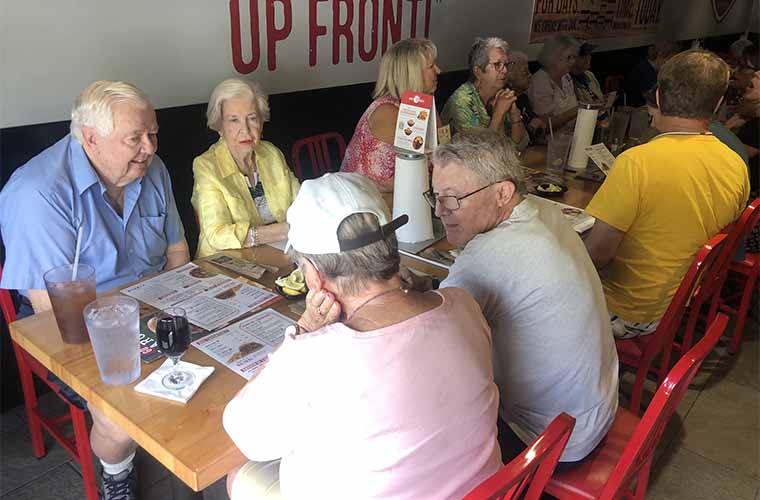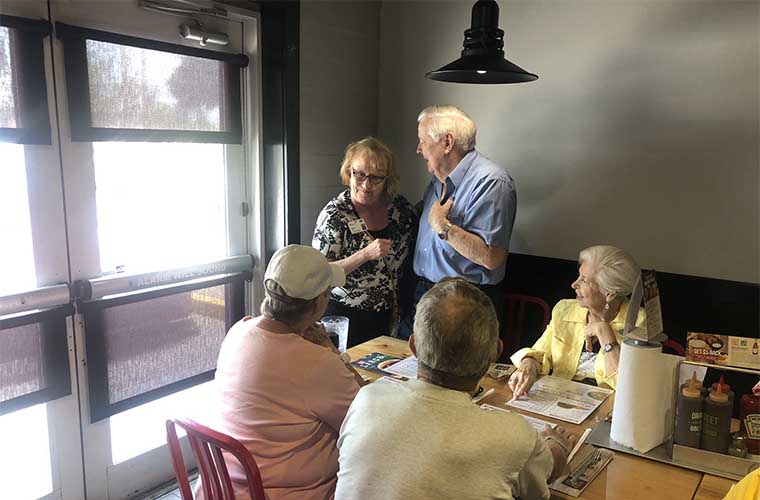BayCare's Memory Disorder Teams Train Restaurants to Offer Dementia-Friendly Dining

“We want to be normal, but we recognize we have some limitations,” said Gary Sprigg, the primary caretaker for his wife, Gayle, who was diagnosed with dementia two years ago.
Those words could be echoed by thousands in the Tampa Bay area, and helping couples like the Spriggs regain some sense of normalcy is one of the purposes of the Madonna Ptak Center for Alzheimer’s Research and Memory Disorders Clinic at Morton Plant Hospital and the Memory Disorders Center at St. Anthony’s Hospital.
The clinic and center offer a myriad of services for those living with dementia and their caregivers. including bi-weekly support groups and monthly caregiver events.
A few years ago, Sprigg suspected his wife might have a memory disorder. A neurologist confirmed missing blood vessels and referred them to Neuropsychologist Robert Rosen, Ph.D., who gave Gayle Sprigg a memory test to confirm Sprigg’s suspicion of a memory disorder.
“As a caregiver, you’re not prepared. You don’t know what’s going on,” Sprigg said.

That’s where Celisa Bonner, a licensed clinical social worker, and her team at the Memory Disorders Clinic, and Kim Saberi, MSW, and her team at the Memory Disorders Center, provide help.
“We meet with the caregivers and patients to help them find resources and navigate the new normal,” Bonner said.
A new resource Bonner has been working to bring to this area is Dementia-Friendly Dining, a program that was started in the Orlando area in 2020 by a caregiver, Dennis Dulniak.
The program works with local restaurants to take the stress out of dining out for people with dementia and their caregivers and allow them to continue to have fun and enjoy life.
Bonner learned of the program through her work as co-chair of the area’s Dementia Care & Cure Initiative (DCCI) task force that meets monthly. The dementia director for the state department of elder affairs introduced Bonner to Dulniak.
Bonner first approached O’Keefe’s Tavern in Clearwater with the idea. Manager John O’Brien’s mother and grandmother both had dementia, so he was eager to have O'Keefe's participate.
“You are a person. You are not your disease,” he said. “It’s nice to make someone feel comfortable.”
Bonner trained O’Keefe’s staff on how to best interact with those living with a memory loss disorder. Sprigg and his wife also came to the restaurant to share their ideas on what worked best.
O’Keefe’s began offering Dementia-Friendly Dining in early January. Customers can come during regular hours, point to the Dementia-Friendly Dining sign on the host stand and experience dining catered to their needs.

A server at Sonny’s BBQ in Palm Harbor heard about the program and asked Chief Kindness Officer Tara Boyle about starting the dining option there. She embraced the idea. After Bonner trained the team, Sonny’s started its program on Valentine’s Day.
Sonny’s area manager Melinda Williams said, “The Dementia-Friendly Dining program helps us understand the disease a little more and be considerate. It gives us a better understanding of what people are going through.”
Recently the restaurant hosted the monthly caregiver support event. Laughter and chatter flowed from the table of 19 that included caregivers, patients and team members from the memory disorders center and clinic.
“So many caregivers feel isolated. It’s good for them to be around others going through the same thing. It’s validating to see they are surviving,” said Gwen Kaldenberg, a social services specialist II for BayCare.
Caregiver William Shideler agreed, “I can speak freely around other caregivers. They understand.”
Bonner has trained a third restaurant – Cali’s in St. Petersburg – and plans to work to continue spreading the program throughout the area. “A program like Dementia-Friendly Dining enhances a person’s dignity and quality of life because of socialization and reducing isolation and depression,” Bonner said.
For more information on other programs and resources, visit Morton Plant Hospital's Madonna Ptak Center for Alzheimer's and Memory Loss page or the Memory Disorders Center (MDC) at St. Anthony's Hospital page.
